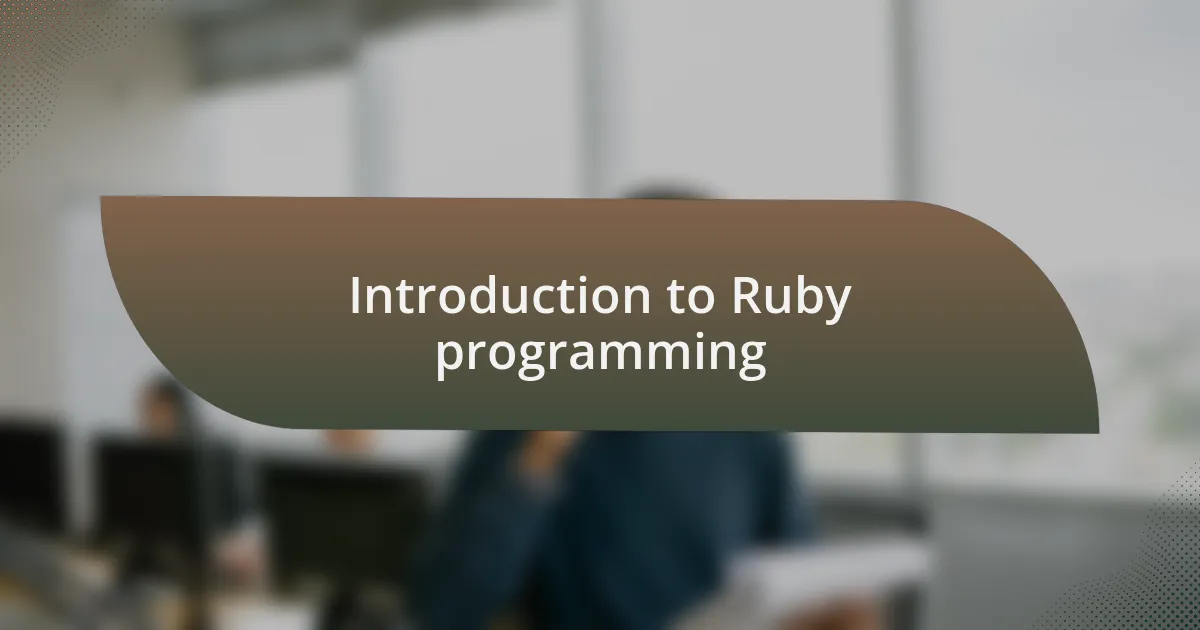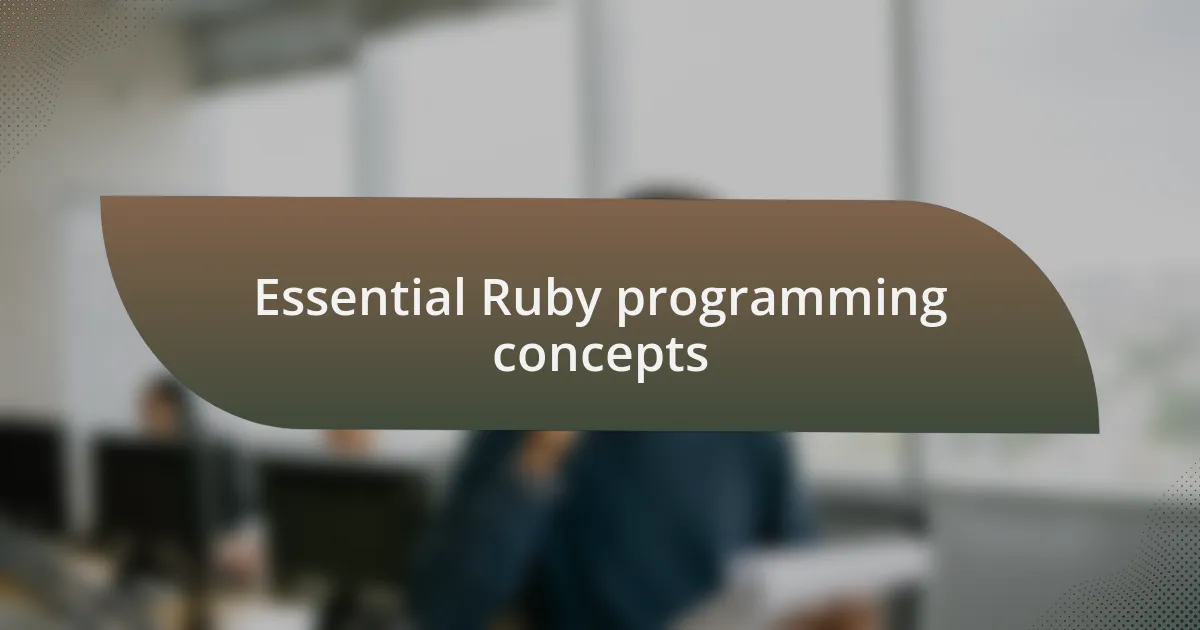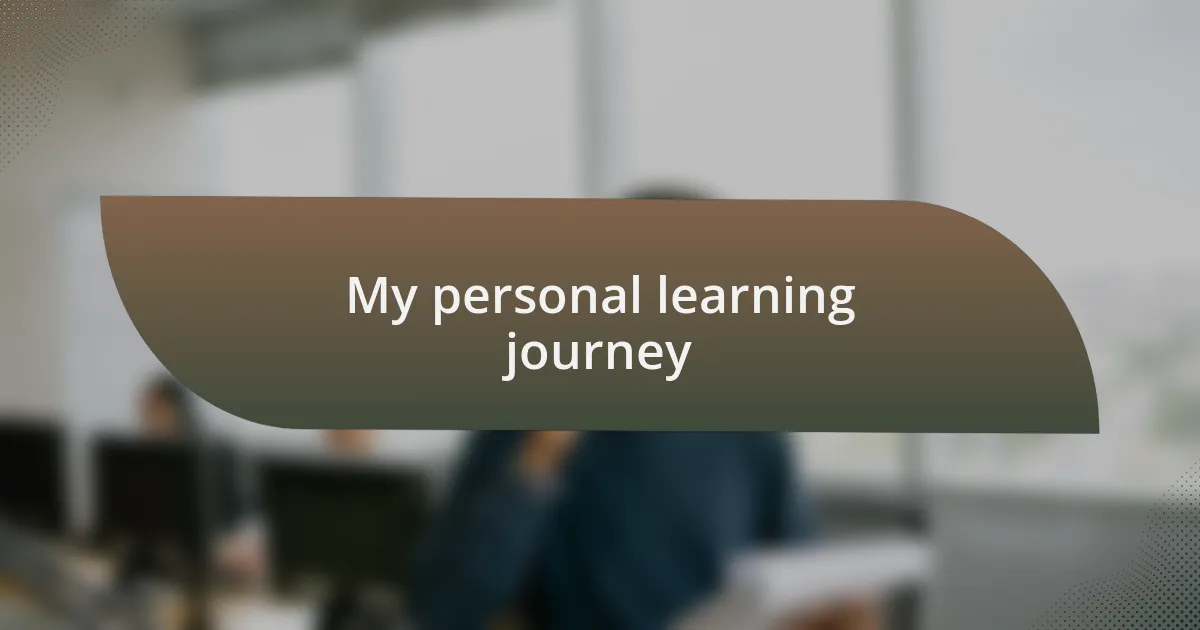Key takeaways:
- Ruby’s elegant syntax and object-oriented nature empower developers, transforming programming into a creative expression.
- The supportive Ruby community enhances the learning experience, providing inspiration and collaboration.
- Key concepts like OOP, blocks, and metaprogramming offer natural, readable, and dynamic coding practices.
- Effective tools like RubyMine, Bundler, and RSpec significantly improve the development process and project management.

Introduction to Ruby programming
Ruby programming, introduced in the mid-1990s, quickly became my go-to language because of its elegant syntax and simplicity. The first time I wrote a Ruby script, I was amazed at how much easier it felt compared to other languages I had studied. Have you ever felt that thrill when a program actually works on the first try? It’s a unique high that Ruby often delivers.
One of the standout features for me has been Ruby’s object-oriented nature. Everything in Ruby is an object, which can be quite a shift for newcomers. I vividly remember feeling empowered as I started understanding how to encapsulate data and functionality within classes—suddenly, programming transformed from a daunting task into a form of creative expression. Isn’t it fascinating how a different approach can change your entire experience of coding?
Moreover, the thriving community surrounding Ruby has been a tremendous source of inspiration and support throughout my journey. Whenever I faced a hurdle, I turned to forums or local meetups, where I encountered passion and collaboration I hadn’t seen elsewhere. This camaraderie truly enriches the learning process; have you ever found a sense of belonging in an online community? For me, those connections deepened my love for Ruby and reinforced the importance of having a supportive network in programming.

Benefits of learning Ruby
One of the most significant benefits of learning Ruby is its readability and concise syntax. I distinctly remember the first time I tackled a project in Ruby; I was able to express complex ideas in just a few lines of code. Have you ever experienced the relief of not having to wade through verbose syntax? That clarity fosters not just understanding but also creativity.
Additionally, Ruby shines in developing web applications, especially with the powerful Rails framework. I recall building my first app with Rails—it felt like I was assembling a puzzle where each piece clicked perfectly into place. The ability to launch a web application quickly while focusing on the innovative aspects rather than getting bogged down in tedious configurations is incredibly refreshing, wouldn’t you agree?
Another advantage I found in learning Ruby is its emphasis on developer happiness. This philosophy is evident in how the language encourages writing code that feels good to write. I often reflect on how important it is to enjoy the programming process itself; after all, if we don’t love what we’re doing, why do it? Embracing Ruby has made coding more enjoyable for me, turning challenges into opportunities for growth and exploration.

Essential Ruby programming concepts
Ruby programming is built around several essential concepts that every developer should grasp. One of the fundamental ideas is object-oriented programming (OOP). In Ruby, everything is an object, which means you can encapsulate behavior and data together. I remember the first time I created a class for a simple blog post; it felt like I was building a tiny universe of shapes and colors, where each instance had its unique identity. The beauty of OOP in Ruby is how natural it feels, allowing developers to think in terms of real-world entities and relationships.
Another concept that I found pivotal in Ruby is the use of blocks and iterators. They allow for a more elegant and concise way to perform actions on collections of data. When I first encountered blocks, I was surprised at how much they simplified my code. Have you ever felt overwhelmed by loops? By using blocks, I could avoid the clutter while still achieving the same functionality—sometimes, it felt like magic. This feature not only enhances readability but also enables more expressive coding patterns.
Finally, understanding Ruby’s flexibility with metaprogramming can be a game changer. While it might sound intimidating, metaprogramming essentially allows you to write code that writes code. There was a moment when I dynamically defined methods on the fly for a project; the thrill of seeing my code adapt to various situations was exhilarating. This level of creativity and dynamism in Ruby truly makes it stand out, encouraging us to explore the bounds of what’s possible. Have you delved into metaprogramming yet? If not, you’re in for an exciting ride, trust me.

Tools for Ruby development
When it comes to tools for Ruby development, my go-to is definitely RubyMine. This integrated development environment (IDE) makes coding a breeze, providing smart code completion and robust debugging features. I recall the first time I used RubyMine; its ability to highlight errors before I even ran my code saved me countless hours of headaches. Have you ever encountered a stubborn bug that you just couldn’t find? With RubyMine’s built-in tools, I felt empowered to tackle those challenges head-on.
Another crucial tool that has made a significant impact on my Ruby projects is Bundler. Managing gems (Ruby libraries) can become unwieldy, especially in larger applications. I vividly remember struggling with version conflicts until I learned about Bundler. It streamlined my workflow; I could specify the exact gem versions for a project and ensure consistency across different environments. Isn’t it reassuring to know that your environment is stable?
I also can’t overlook the importance of RSpec for testing in Ruby development. As I started adopting test-driven development (TDD), RSpec transformed my approach to coding. Writing tests became almost a creative endeavor, allowing me to envision how the code would behave. Have you experienced that satisfaction when your code passes all tests? It’s like receiving a gold star for your hard work, and it significantly boosts my confidence in deploying projects.

My personal learning journey
There was a time when diving into Ruby programming felt overwhelming. I remember sitting at my laptop, staring at the screen, feeling the weight of my inexperience. Yet, every small victory, like successfully running a simple script, fueled my passion further. Have you ever felt that rush when everything clicks into place?
As I progressed, I stumbled upon online communities and forums. Engaging with fellow Ruby developers has been one of the most significant aspects of my learning journey. I clearly remember sharing a particularly puzzling issue on a forum, only to receive several helpful responses that not only solved my problem but also deepened my understanding of Ruby’s nuances. It felt like a warm embrace from a community that genuinely wanted to see me succeed.
Practicing consistently has been key to my development. I set aside dedicated time each week to tackle new challenges and apply what I learned. There were moments of frustration, where I’d hit a wall and question my abilities. But pushing through those tough spells led to breakthroughs I never anticipated. Do you remember a point in your learning when you felt utterly stuck, only to emerge with a new perspective? That feeling of growth is invaluable.

Challenges I faced in Ruby
Learning Ruby came with its share of challenges, especially when I first encountered the Rails framework. I remember feeling overwhelmed by the conventions and structure it demanded. Every time I thought I grasped a concept, I stumbled upon new gems—pun intended—that made me question everything I thought I knew. Have you ever dealt with a framework that felt like learning a new language all over again?
Another hurdle was debugging. I often found myself lost in a sea of error messages that seemed cryptic at best. I recall one instance where a simple typos cost me hours of frustration. Although it was painful at the moment, those debugging sessions taught me to pay closer attention to detail and become more methodical in my approach. Isn’t it fascinating how mistakes can lead to profound learning?
Lastly, I faced the challenge of finding the right resources. For a while, I jumped between tutorials, articles, and videos, which left me more confused than enlightened. I distinctly remember being halfway through a course only to realize it lacked depth on key concepts. That experience made me more discerning about the quality of resources I engaged with, reinforcing the importance of commitment to reliable, well-structured material. Have you ever felt like you were drowning in information instead of swimming in knowledge?